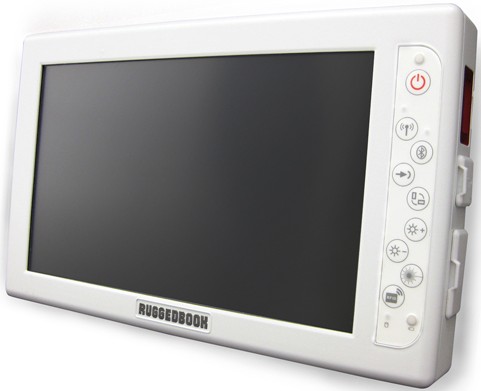As usual there were a lot of things that happened during the week, and not all of it was pharmacy or technology related. Here’s a quick look at some of the stuff I found interesting.
(more…)
Tag: Tablet PCs
-
“What’d I miss?” – Week of January 17th
-
Can the Apple tablet, i.e. the iSlate, resurrect interest for tablets in healthcare?
I read an interesting blog today. In the blog the author states that:
An Apple tablet would be the ultimate UI for electronic medical records. With a touch-screen display like the iPhone, using the EMR during an encounter would be simplified. For example, selecting an evaluation and management (E&M) code could be as easy as “dialing in†the code with a swipe of a finger.
Using the iPhone’s intelligent keyboard technology, the device could have a very sophisticated automatic coding tool. Some EMRs can already auto-generate E&M codes based on information collected during the patient encounter. Combine this with the iPhone’s keyboard word suggestion tool, and physicians could rapidly select codes. Additionally, just as the iPhone adapts its keys and layout for different applications, the Mac Tablet could display a unique keyboard setting for each EMR function.
Using iPhone speech recognition technology, physicians could dictate directly into an EMR to create notes, draft narrative reports or generate custom patient instructions. Mac design programs could be repurposed to make a really slick tablet drawing tool for anatomical diagrams that illustrate procedures and diagnoses.
There is no question that I think tablets are underutilized in healthcare. I have pushed them into the hands of pharmacists at my facility and have tried various different things to encourage their use. While I would love to see tablet computers adopted in mass among healthcare systems, I just don’t think it’s in the cards for the iSlate for several reasons.
(more…) -
Impact of Handheld Technology on Hospital Practice
The Impact of Mobile Handheld Technology on Hospital Physicians’ Work Practices and Patient Care: A Systematic Review1
The Journal of the American Medical Informatics Association
Mirela Prgomet, Andrew Georgiou, Johanna I WestbrookAbstract
The substantial growth in mobile handheld technologies has heralded the opportunity to provide physicians with access to information, resources, and people at the right time and place. But is this technology delivering the benefits to workflow and patient care promised by increased mobility? The authors conducted a systematic review to examine evidence regarding the impact of mobile handheld technology on hospital physicians’ work practices and patient care, focusing on quantification of the espoused virtues of mobile technologies. The authors identified thirteen studies that demonstrated the ability of personal digital assistants (PDAs) to positively impact on areas of rapid response, error prevention, and data management and accessibility. The use of PDAs demonstrates the greatest benefits in contexts where time is a critical factor and a rapid response crucial. However, the extent to which these devices improved outcomes and workflow efficiencies because of their mobility was largely absent from the literature. The paucity of evidence calls for much needed future research that asks explicit questions about the impact the mobility of devices has on work practices and outcomes.
-
New medical tablet from Sanwell offers RFID, barcode scanner
Samwell has introduced a tablet PC designed specifically for the medical industry. The tablet is dubbed the MCA9 and offers a 1.6GHz Atom processor, a two megapixel camera, a RFID reader and optional bar code scanner, and an 8.9-inch TFT-LCD touch screen that is readable in sunlight.
According to Samwell: “designed for medical application, the ability for data capture, record and transmission is highly valued. The built-in 2-megapixel camera is centrally mounted on the backside. The 1D/2D Barcode Scanner and 13.56 RFID reader support electronic medication administration records, reliable patient identification, and medical tracking.â€
I’m skeptical of tablets with built in bar code scanners designed for “medical applicationâ€. The Motion Computing C5 tablet has a similar design. Our facility trialed a C5 tablet earlier this year and nurses found it difficult to use and too heavy to carry for extended periods. The two megapixel camera and small screen may also present a problem for documentation and viewing patient data.

-
Are smartphones a viable platform for pharmacy practice?
 It’s no secret that I’m a big fan of tablet PCs. In fact, I can’t imagine life without one. The reason why acute care pharmacists haven’t adopted the tablet PC platform escapes me. My complete opinion on the matter can be found here.
It’s no secret that I’m a big fan of tablet PCs. In fact, I can’t imagine life without one. The reason why acute care pharmacists haven’t adopted the tablet PC platform escapes me. My complete opinion on the matter can be found here.With the growing need for real-time access to patient data it no longer makes sense to be anchored to a desktop PC at the point-of-care. Couple this with the rapid growth of portable technology and you have a rare opportunity to develop a mobile pharmacy practice in the acute care setting. Whether that model will utilize tablet PCs, UMPCs, WebStations, netbooks or other mobile device remains to be seen.
(more…) -
“What’d I miss?” – Week of December 20th
As usual there were a lot of things that happened during the week, and not all of it was pharmacy or technology related. Here’s a quick look at some of the stuff I found interesting.
(more…) -
“What’d I miss?” – Week of November 29th
As usual there were a lot of things that happened during the week, and not all of it was pharmacy or technology related. Here’s a quick look at some of the stuff I found interesting.
(more…)
 2009 brought many new and exciting changes not only in my personal life, but in the world of pharmacy and technology as well. I’ve learned many new things, gained some skills previously absent from my armamentarium, met some great new people, discovered the “real†internet for the first time, traveled more than ever before, discovered I don’t know diddly squat about a great many things, and am more excited about the next year than I can remember in recent history.
2009 brought many new and exciting changes not only in my personal life, but in the world of pharmacy and technology as well. I’ve learned many new things, gained some skills previously absent from my armamentarium, met some great new people, discovered the “real†internet for the first time, traveled more than ever before, discovered I don’t know diddly squat about a great many things, and am more excited about the next year than I can remember in recent history.